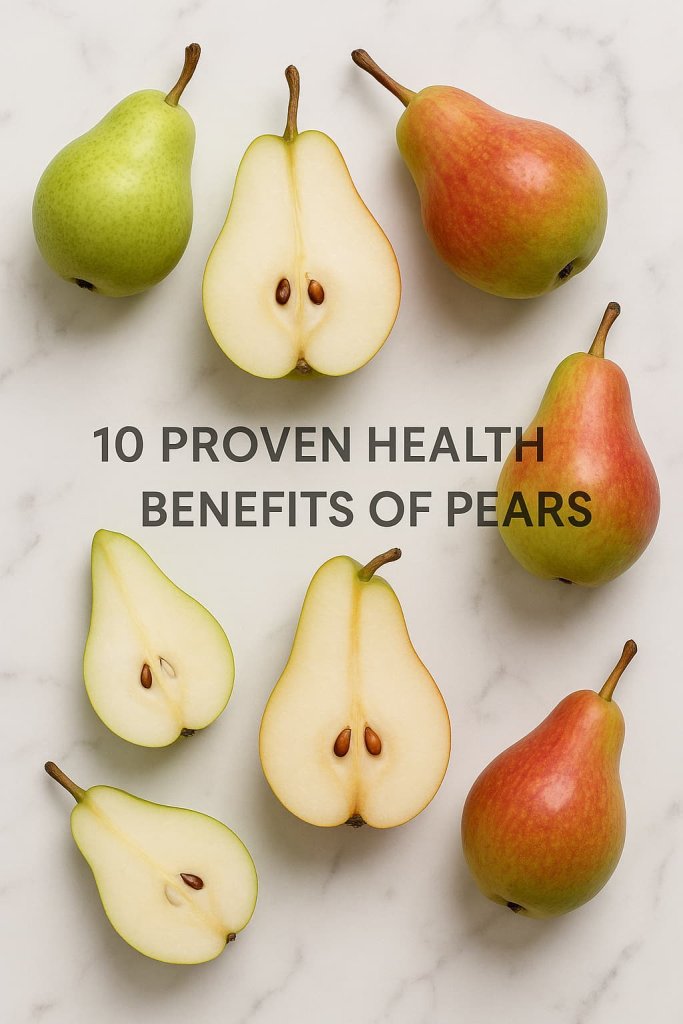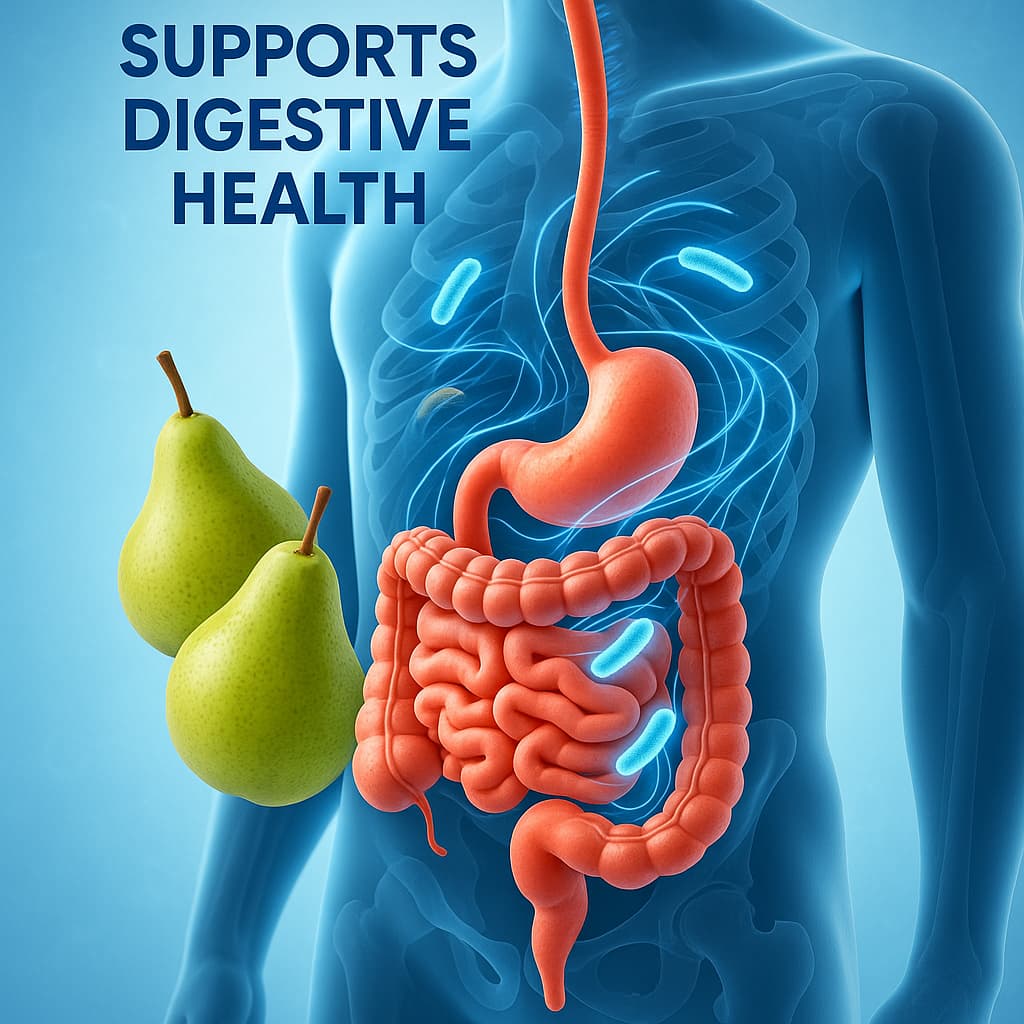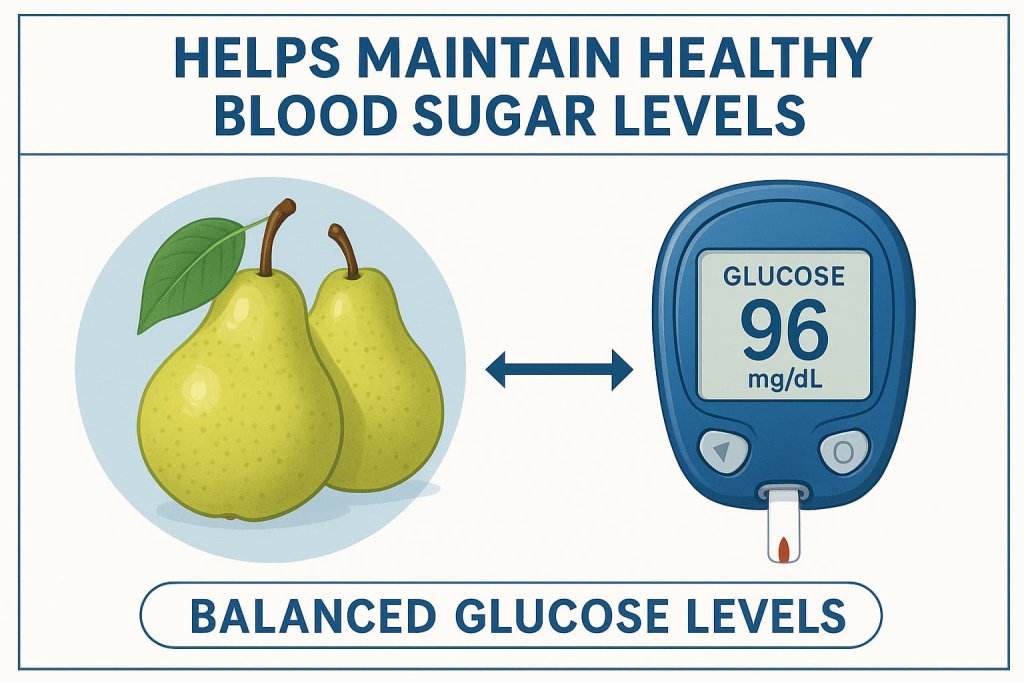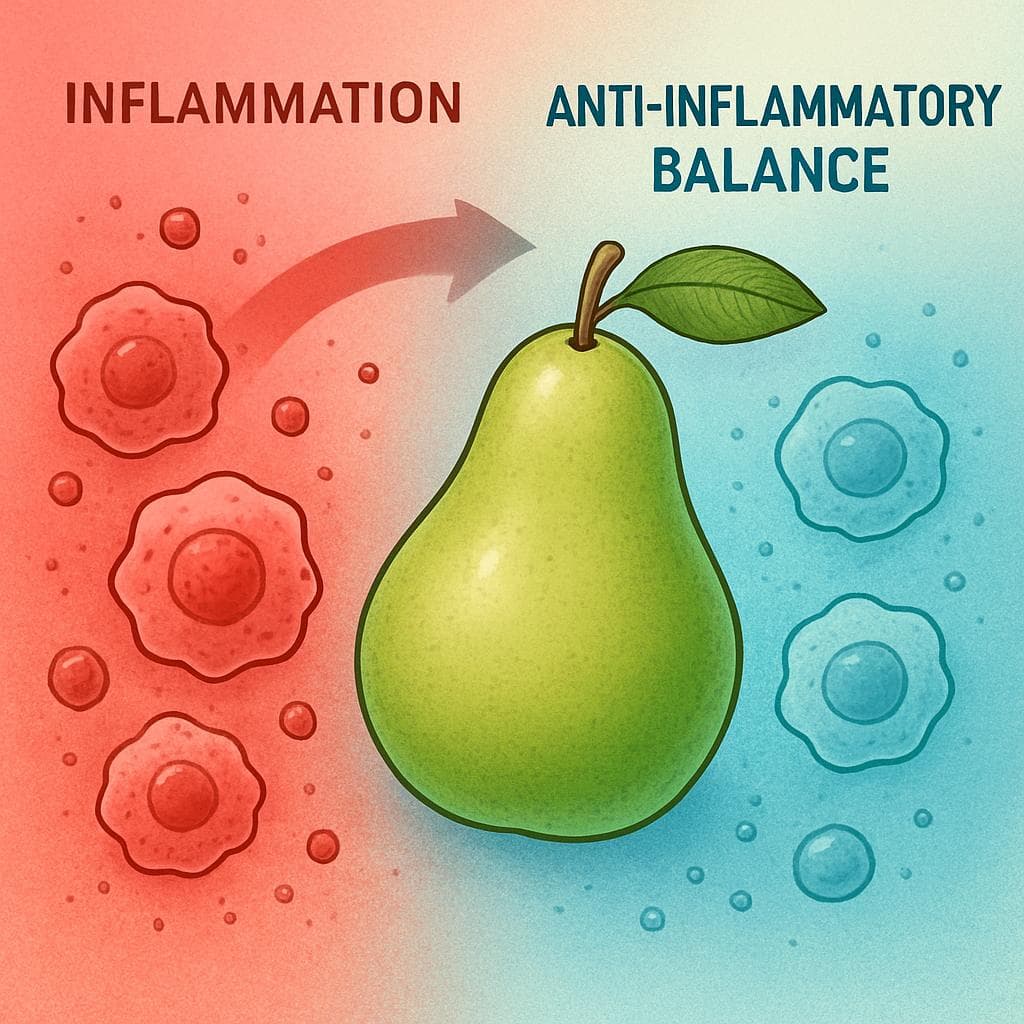Pears are rich in fiber, antioxidants, and plant nutrients that support digestion, heart health, and blood sugar balance.
Understanding the nutritional power of pears can help you make smarter dietary choices for long-term wellness. From improving gut function to promoting hydration, pears offer a range of science-backed benefits when included as part of a balanced diet.

What Makes Pears So Healthy?
Pears are nutrient-rich fruits loaded with fiber, antioxidants, and essential vitamins that support overall health and wellbeing.
They provide a natural blend of carbohydrates, fiber, vitamin C, potassium, and water — nutrients that promote digestive balance, heart health, and hydration. Their nutritional density makes them one of the most balanced fruits for daily wellness.
According to the U.S. Department of Agriculture (USDA) FoodData Central, 2024, one medium raw pear (approximately 178 grams) contains:
| Nutrient | Amount (per 1 medium pear) | % Daily Value (DV) |
|---|---|---|
| Calories | 102 kcal | — |
| Carbohydrates | 27 g | — |
| Dietary Fiber | 6 g | 21 % |
| Sugars | 17 g | — |
| Protein | 0.6 g | — |
| Vitamin C | 8 mg | 9 % |
| Potassium | 206 mg | 4 % |
| Folate | 12 µg | 3 % |
| Water | 84 % | — |
Source: USDA FoodData Central – Pears, raw (2024)
Pears are naturally low in fat, cholesterol, and sodium, while being high in fiber and hydration-promoting water. Their skin is especially rich in flavonoids, chlorogenic acid, and anthocyanins, which act as antioxidants that help reduce oxidative stress in the body.
The Harvard T.H. Chan School of Public Health emphasizes the importance of including whole fruits like pears in a balanced diet for heart, metabolic, and digestive health. Whole fruits are also linked to lower risk of chronic diseases when eaten regularly as part of a plant-forward diet.
Because of their unique composition of fiber, vitamins, minerals, and phytonutrients, pears may help support gut health, regulate metabolism, and maintain overall body balance — making them a smart addition to any healthy eating plan.
10 Proven Health Benefits of Pears (Backed by Science)
Pears are more than just a sweet, juicy fruit — they’re a nutrient powerhouse rich in fiber, antioxidants, and plant-based compounds that promote overall health.
Here are ten science-backed ways pears may support your digestion, metabolism, immunity, and long-term wellness.
1. Supports Digestive Health

Pears are among the richest fruit sources of dietary fiber, containing both soluble pectin and insoluble cellulose, which together promote healthy bowel movements and nourish beneficial gut bacteria.
According to the Cleveland Clinic, fiber from pears may help maintain digestive balance and prevent constipation by softening stool and enhancing regularity.
They also contain sorbitol, a natural sugar alcohol that acts as a gentle osmotic agent — drawing water into the colon and easing occasional irregularity.
Including pears as part of your daily diet supports long-term gut function and may contribute to a healthier microbiome environment.
2. May Help Manage Weight

With a low energy density (0.64 kcal/g) and high fiber content, pears provide lasting satiety with fewer calories.
A clinical trial published in Food & Function (2021) found that adults who ate one medium pear daily experienced reduced body weight and improved diet quality after 12 weeks.
Replacing processed snacks with fresh pears may help regulate appetite, reduce overeating, and naturally support healthy body composition — especially when paired with lean protein and whole grains.
3. Supports Heart Health

Pears are abundant in polyphenols, including flavonoids and chlorogenic acid, which help neutralize oxidative stress and support vascular function.
A 2019 study in Nutrients found that people with higher apple-and-pear intake had a lower risk of heart disease and stroke.
The potassium in pears also plays a vital role in maintaining normal blood pressure by balancing sodium levels in the body — a benefit confirmed by the NIH Office of Dietary Supplements.
Regular consumption of pears can therefore support cardiovascular wellness when combined with a diet rich in vegetables and whole grains.
4. Helps Maintain Healthy Blood Sugar Levels

Despite their natural sweetness, pears have a low glycemic index (GI ≈ 38) and a high fiber-to-sugar ratio, which helps slow glucose absorption and prevent sharp spikes in blood sugar.
According to WebMD, pears may help improve insulin sensitivity and glycemic control when eaten as part of a balanced diet.
Their combination of soluble fiber and polyphenols helps modulate carbohydrate metabolism, making pears a smart fruit choice for those managing blood sugar levels or insulin resistance.
5. Provides Powerful Antioxidants

Pears are naturally rich in vitamin C, quercetin, and anthocyanins — potent antioxidants that help defend cells from oxidative damage.
A 2020 review in Molecules found that pear polyphenols possess antioxidant and anti-inflammatory properties that may contribute to better metabolic and cardiovascular health.
These bioactives may also support skin elasticity, cellular repair, and long-term protection against environmental stressors. Red- or purple-skinned pears tend to have the highest antioxidant concentration.
6. Supports Immune Function

Vitamin C in pears plays an essential role in immune cell defense, collagen synthesis, and tissue repair.
Combined with the fruit’s antioxidant polyphenols, it helps strengthen the body’s resistance to oxidative stress.
The NIH Office of Dietary Supplements notes that adequate vitamin C intake supports immune system performance and reduces the duration of mild seasonal infections.
Eating pears regularly, especially during colder months, is an easy way to maintain daily immune resilience.
7. May Promote Gut Microbiome Balance

Pears are naturally rich in pectin, a soluble fiber that acts as a prebiotic, nourishing beneficial gut bacteria such as Bifidobacterium and Lactobacillus.
These friendly microbes ferment dietary fiber to produce short-chain fatty acids (SCFAs) — compounds that help maintain the intestinal barrier, regulate inflammation, and support overall metabolic health.
According to a 2024 review published in the Journal of Functional Foods, prebiotic fibers like pectin play a key role in improving gut barrier integrity, nutrient absorption, and immune balance.
Regularly eating fiber-rich fruits such as pears may therefore support digestive wellness, immune function, and even mood regulation — since much of the body’s serotonin is produced in the gut.
By maintaining a diverse and balanced gut microbiome, pears contribute to long-term gastrointestinal and metabolic health in a natural, food-based way.
8. May Support Anti-Inflammatory Balance

Pears contain plant compounds such as catechins, caffeic acid, and ferulic acid, which exhibit measurable anti-inflammatory activity.
Laboratory and animal studies from the National Library of Medicine suggest these polyphenols help modulate inflammation pathways and oxidative balance.
While more human trials are needed, including pears regularly as part of an anti-inflammatory diet — rich in fruits, vegetables, and omega-3 fats — may support cellular health and metabolic balance over time.
9. Promotes Hydration and Skin Health

Pears are approximately 84 % water, making them a hydrating fruit that supports fluid balance throughout the day.
Their combination of water, potassium, and vitamin C promotes natural detoxification, electrolyte stability, and healthy skin appearance.
According to the Harvard T.H. Chan School of Public Health, hydration plays a key role in skin elasticity and cellular repair.
Eating pears with their skin provides extra antioxidants that may help maintain a radiant complexion while protecting against oxidative damage.
10. Supports Longevity and Overall Wellness

Regular fruit consumption — especially of apples and pears — has been linked to lower mortality and reduced chronic disease risk.
A large cohort analysis published in Nutrients found that individuals who ate more apples and pears experienced better overall health outcomes and lower inflammation markers.
Pears deliver a nutritional synergy: fiber for digestive health, potassium for cardiovascular balance, and antioxidants for cellular protection.
As part of a diverse, plant-forward diet, they may support long-term wellness, vitality, and healthy aging.
How to Eat Pears for Maximum Benefits
To get the most nutritional value from pears, eat them fresh, ripe, and with the skin on.
Most antioxidants and fiber are concentrated in the peel, so washing rather than peeling is the best way to retain their full health potential.
Best Ways to Enjoy Pears:
- Eat them raw: A crisp, fresh pear makes a perfect on-the-go snack or addition to salads and oatmeal.
- Blend into smoothies: Combine with spinach, yogurt, and oats for a fiber-rich breakfast.
- Bake or poach: Lightly baking or poaching softens the fruit, making it easier to digest for sensitive stomachs.
- Add to savory dishes: Pears pair well with cheese, nuts, and greens — a favorite combination in Mediterranean-style diets.
Portion and Pairing Tips:
- Ideal serving size: One medium pear (about 150–180 g) per day is a balanced portion for most adults.
- Pair with protein or healthy fats: Combine pears with almond butter, Greek yogurt, or cheese to stabilize blood sugar and enhance satiety.
- Hydrate naturally: Because pears are 84% water, they support hydration — especially when eaten post-workout or during hot weather.
Expert tip: According to the Harvard T.H. Chan School of Public Health, whole fruits provide the best nutrient absorption and fiber benefits — better than fruit juices or processed fruit snacks.
Storage and Food Safety Tips
Proper storage keeps pears fresh, nutritious, and safe to eat.
Following guidance from the FDA and USDA helps reduce contamination and maintain quality.
- Ripening: Store unripe pears at room temperature (60–70°F) until slightly soft.
- Refrigeration: Once ripe, refrigerate at ≤ 40°F (4°C) to slow ripening and preserve nutrients.
- Shelf Life: Fresh pears last 3–5 days; cut pears should be eaten within 24–48 hours.
- Washing: Rinse under running water before cutting or eating—no soap needed.
- Separation: Keep pears away from raw meats and seafood to prevent cross-contamination.
- Drying: Pat dry with a clean towel to reduce mold growth.
Proper handling supports both food safety and nutrient retention, ensuring your pears stay fresh, clean, and healthy.
Possible Side Effects and Precautions
While pears are generally safe and beneficial for most people, moderation and awareness of sensitivities are important.
1. Digestive Sensitivity
Pears contain sorbitol, a natural sugar alcohol that may cause bloating or mild discomfort in people with irritable bowel syndrome (IBS).
If sensitive, start with smaller portions or cook the pears lightly to aid digestion.
2. Allergy Considerations
Individuals with birch pollen allergies may experience mild oral reactions when eating raw pears — a condition known as Oral Allergy Syndrome (OAS).
This occurs because certain proteins in pears resemble those found in birch tree pollen, triggering a localized allergic response in sensitive individuals.
According to the American Academy of Allergy, Asthma & Immunology (AAAAI), OAS is common among adults with birch pollen allergy, affecting up to 50–75% of those individuals. Typical symptoms include mild itching, tingling, or swelling of the lips, mouth, or throat shortly after eating raw pears or related fruits like apples.
Peeling or cooking pears can significantly reduce allergenic proteins, as heat alters their structure and prevents immune cross-reactivity.
People who experience symptoms should avoid raw pears during peak pollen seasons and consult a board-certified allergist for personalized diagnosis or management options.
Eating pears in cooked or canned form is generally considered safe for most individuals with OAS.
3. Sugar Intake and Diabetes
Although pears have a low glycemic index, overconsumption can increase natural sugar intake.
People with diabetes should follow portion control and pair pears with protein or healthy fats to balance glucose levels.
(Source: WebMD – Pears and Diabetes)
4. Medication Interactions
There are no major drug interactions with pears; however, individuals taking gastrointestinal or laxative medications should consult a healthcare provider, as excess fiber or sorbitol may amplify effects.
By consuming pears mindfully and washing them properly, you can enjoy their benefits while minimizing any potential discomfort.
Frequently Asked Questions (FAQ)
1. Are pears good for digestion?
Yes. Pears are high in fiber and pectin, which help support regular bowel movements and gut microbiome health.
2. Can people with diabetes eat pears?
Absolutely. Pears have a low glycemic index (around 38) and help support stable blood sugar when eaten with balanced meals.
3. Should I eat pear skin?
Yes — pear skin is rich in antioxidants and fiber. Just make sure to rinse the fruit thoroughly before eating.
4. How many pears can I eat per day?
One medium pear daily fits well into most balanced diets. Those with sensitive digestion may prefer half a pear at a time.
5. Are pears safe during pregnancy?
Yes. Pears provide folate, vitamin C, and fiber that support maternal health. Always wash thoroughly before eating.
6. Are canned or dried pears as healthy as fresh ones?
Fresh and frozen pears retain the most nutrients. Choose canned pears packed in water or juice — not syrup — to avoid added sugars.
7. Can pears help with weight management?
Yes. Their high fiber and water content may promote fullness and help reduce calorie intake naturally.
Conclusion
Pears are a simple yet powerful addition to a balanced diet — supporting digestive health, hydration, blood sugar balance, and heart wellness.
They are naturally high in fiber and antioxidants while being low in fat and calories, making them ideal for daily consumption.
For best results, eat pears fresh, with the skin, and as part of a varied, plant-forward diet that includes other fruits and vegetables.
This content is for informational purposes only and not medical advice.
References
- USDA FoodData Central – Pears, raw (2024)
https://fdc.nal.usda.gov/fdc-app.html#/food-details/2346851/nutrients
Provides official nutrient data for pears including calories, fiber, potassium, and vitamin C. - Molecules (2020) – Pear (Pyrus spp.) Polyphenols and Health Effects
https://www.ncbi.nlm.nih.gov/pmc/articles/PMC7582546/
Scientific review highlighting antioxidant and anti-inflammatory properties of pear bioactive compounds. - Nutrients (2019) – Apple and Pear Intake and Cardiometabolic Health
https://www.ncbi.nlm.nih.gov/pmc/articles/PMC6813372/
Cohort evidence linking regular pear consumption to better heart and metabolic outcomes. - Food & Function (2021) – Daily Pear Consumption and Weight Management in Adults
https://pubmed.ncbi.nlm.nih.gov/33488957/
Clinical study showing reduced body weight and improved diet quality with daily pear intake. - FDA – Buy, Store & Serve Safe Food
https://www.fda.gov/food/consumers/buy-store-serve-safe-food
Official federal guidance on safe storage, refrigeration, and handling of produce. - American Academy of Allergy, Asthma & Immunology (AAAAI) – Oral Allergy Syndrome (OAS)
https://www.aaaai.org/tools-for-the-public/conditions-library/allergies/oral-allergy-syndrome-(oas)
Explains oral allergy reactions caused by birch-pollen cross-reactivity in fruits such as pears.
